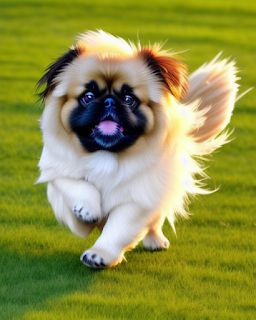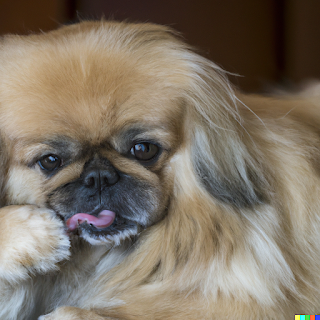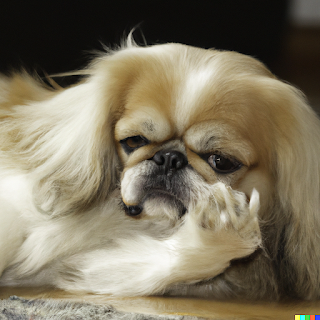Why Does My Pekingese Dog Do That? A Guide to Understanding Canine Behavior
Hey there, fellow dog enthusiasts! If you're reading this article, it's safe to say you're curious about why your furry friend behaves the way they do. From barking and chewing to tail wagging and, yes, even poop-eating, dogs are complex creatures with a range of behaviors that can sometimes leave us scratching our heads. So, let's explore some of the most common dog behaviors and try to answer the question we've all asked ourselves at some point: "Why does my dog do that?" Consult your veteranarian for treatment options or behavioral modification suggestions.
Let's start with barking. Oh boy, do dogs love to bark! And while it can be cute and endearing at times, excessive barking can quickly become a nuisance. So, why does your dog bark so much? Well, it could be for a variety of reasons. They're feeling anxious or bored, or maybe they're trying to protect their territory. The key is to figure out what's triggering the behavior and address it appropriately. We want to view them as perfect little angels.
One common reason for excessive barking is separation anxiety. Dogs are social creatures, and they often feel anxious and stressed when left alone for extended periods of time. If your pup barks excessively when you leave the house, it could be a sign of separation anxiety. To address this, you can try crate training, which can provide your dog with a safe and secure space while you're away. You can also try leaving a piece of clothing with your scent on it to comfort your dog or leaving a radio or TV on to provide background noise.
Another common reason for barking is boredom. Dogs are intelligent animals, and they need mental and physical stimulation to keep them happy and healthy. If your dog is barking excessively out of boredom, you can try providing them with plenty of toys and puzzles to keep their minds occupied. You can also try taking them for long walks or runs or enrolling them in doggy daycare to provide them with socialization and exercise.
Now, let's talk about chewing. Puppies seem to have a knack for chewing everything in sight, from your favorite pair of shoes to sofa cushions. But even adult dogs can develop a chewing habit if they're feeling stressed or bored. So, why does your dog chew on everything? One theory is that it helps to alleviate anxiety and stress. Another is that it's simply a fun activity that releases endorphins in the brain.
Whatever the reason, it's important to provide your pup with plenty of appropriate chew toys and to supervise them when they're in "chew mode" to prevent any damage to your home or belongings. It's also important to ensure that your dog is getting enough exercise and mental stimulation. A tired dog is a happy dog, and a happy dog is less likely to engage in destructive chewing behavior.
And now, let's tackle the big one: poop-eating. Yes, it's gross behavior, but it's also a surprisingly common one. So, why does your dog eat poop? Well, there are a few theories. Some experts believe that dogs eat poop simply because they like the taste (yuck!). Others believe that it's a behavior inherited from their wolf ancestors, who would eat feces to keep their dens clean. Still, others think that it's a sign of nutrient deficiencies or digestive issues.
Whatever the reason, it's important to discourage this behavior and provide your pup with a healthy, balanced diet to prevent any nutritional deficiencies. You can also try feeding your dog smaller meals more frequently throughout the day, which can help to prevent them from feeling hungry and looking for alternative food sources (like poop!).
It's also important to supervise your dog when they're outside and to clean up after them promptly. If you have multiple dogs, it's a good idea to separate them during feeding times to prevent any competition over food. You can also try using deterrents, like bitter apple spray, to make poop less appealing to your dog.
Now, let's move on to tail-wagging. Ah, the classic sign of a happy dog, right? Well, not always. While a wagging tail can certainly indicate a happy, excited dog, it can also mean other things. For example, a tail that's wagging low and slow could indicate fear or submission, while a tail that's held high and rigid could indicate aggression.
It's important to pay attention to your dog's body language as a whole, not just its tail, to get a better sense of its mood and intentions. If your dog's tail is wagging but they're showing other signs of aggression (like bared teeth or a stiff body), it's best to give them some space and avoid approaching them until they've calmed down.
And finally, let's talk about jumping. While it can be cute when a small puppy jumps up to greet you, it can quickly become a problem when you're dealing with a larger, more energetic dog. So, why do dogs jump? Well, it's often a sign of excitement and enthusiasm. Dogs are social creatures, and they want to be close to their human companions, which can lead to jumping behavior.
To discourage jumping, it's important to train your dog to greet you in a more appropriate manner. You can do this by teaching them the "sit" command and rewarding them for good behavior. You can also try turning your back on your dog when they jump up to greet you, which can signal to them that jumping is not an effective way to get your attention.
In conclusion, there are a variety of reasons why dogs behave the way they do, from barking and chewing to tail wagging and poop eating. By paying attention to your dog's body language and providing them with appropriate outlets for their energy and emotions, you can help them lead a happy and healthy life. And if all else fails, just remember sometimes dogs do weird things just because they can, and that's part of what makes them so lovable and entertaining!
Q&A, you wanted to know, and Pekingese Guide has the answer:
Why do Pekingese dogs bark?
Pekingese dogs are known for their bold personalities and their tendency to bark, sometimes excessively. But why do they bark so much? One reason may be due to their protective nature. Pekingese were originally bred as guard dogs, and their barking may be a way to alert their owners to potential dangers.
Another reason may be due to boredom or anxiety. Pekingese dogs are intelligent and need mental stimulation to keep them occupied. Without proper exercise and mental stimulation, they may become bored and bark to release pent-up energy.
To address excessive barking in Pekingese dogs, it's important to first identify the underlying cause. If it's due to anxiety or boredom, providing more exercise and mental stimulation can help. Additionally, training and positive reinforcement can be practical in teaching your Pekingese to bark less and listen to commands.
Why do Pekingese dogs shake?
Pekingese dogs are also known for their distinctive shaking or shivering, which can be a concern for their owners. But why do they shake? One reason may be due to their small size and lack of body fat. Pekingese dogs have a low body fat percentage, which means they may be more susceptible to feeling cold.
Another reason may be due to anxiety or fear. Pekingese dogs can be sensitive and may shake to cope with stress or nervousness.
If your Pekingese dog is shaking excessively, it's important to rule out any underlying medical conditions, such as hypoglycemia or hypothyroidism. Additionally, providing a warm and comfortable environment, as well as addressing any underlying anxiety or stress, can help reduce shaking in Pekingese dogs.
Why do Pekingese dogs shed so much?
Pekingese dogs have long, fluffy coats that can shed a lot, leaving their owners constantly vacuuming and cleaning. But why do they shed so much? One reason may be due to their double coat, which consists of a soft undercoat and a longer topcoat. This double coat helps protect them from the cold and from the sun, but it also means they shed a lot.
Another reason may be due to stress or illness. Pekingese dogs can be sensitive to changes in their environment or routine, and this stress can cause them to shed more.
To manage shedding in Pekingese dogs, it's important to groom them regularly, including brushing their coat and trimming their hair. Additionally, providing a healthy diet and managing any underlying stress or anxiety can help reduce shedding.
Why do Pekingese dogs dig?
Pekingese dogs may have a reputation for being lap dogs, but they are also active and curious. They may enjoy digging as a way to explore their surroundings or to entertain themselves. Additionally, Pekingese dogs may dig to create a cool spot to rest in hot weather.
To manage digging in Pekingese dogs, it's important to provide them with appropriate outlets for their energy and curiosity. This may include providing interactive toys, taking them for walks or hikes, and providing a designated digging area, such as a sandbox or digging pit.
Why do Pekingese dogs eat poop?
Coprophagia, or the eating of feces, is a behavior that many dogs exhibit, including Pekingese dogs. This behavior can be caused by a range of factors, including nutritional deficiencies, behavioral issues, or medical conditions.
To address this behavior in Pekingese dogs, it's important to first identify the underlying cause. This may involve changing their diet or providing more mental stimulation and exercise. Additionally, cleaning up after your Pekingese promptly and discouraging them from engaging in this behavior can help manage coprophagia.
Overall, understanding why our Pekingese dogs exhibit certain behaviors is an important part of providing them with appropriate care and management. By addressing the underlying causes of their behavior, we can build a stronger and more rewarding relationship with our furry friends.
Why do Pekingese dogs snore?
Pekingese dogs are known for their flat faces, which can contribute to snoring and other respiratory issues. Their short snouts and small nostrils can make it more difficult for them to breathe, especially when they are sleeping.
To manage snoring in Pekingese dogs, it's important to ensure that they are at a healthy weight and that they have access to fresh air and cool temperatures. Additionally, raising their head while they sleep can help improve their breathing and reduce snoring.
Why do Pekingese dogs lick?
Licking is a common behavior in dogs, and Pekingese dogs are no exception. Dogs may lick as a way to show affection, to clean themselves, or to communicate with their owners.
To manage licking in Pekingese dogs, it's important to first identify the underlying cause. If it's due to anxiety or stress, providing more exercise and mental stimulation can help. Additionally, training and positive reinforcement can be practical in teaching your Pekingese to reduce excessive licking.
Why do Pekingese dogs have watery eyes?
Pekingese dogs may have a tendency to have watery eyes, which can be a concern for their owners. This may be due to their prominent eyes, which can be more susceptible to irritation and infection.
To manage watery eyes in Pekingese dogs, it's important to keep their eyes clean and free from debris. Additionally, providing a healthy diet and addressing any underlying medical conditions, such as allergies or infections, can help reduce watery eyes.
Why do Pekingese dogs snarl?
Pekingese dogs may snarl to communicate their discomfort or displeasure. They may snarl if they feel threatened or if they are in pain.
To manage snarling in Pekingese dogs, it's important to first identify the underlying cause. If it's due to anxiety or fear, providing a calm and safe environment can help. Additionally, training, and positive reinforcement can be effective in teaching your Pekingese to communicate in a more appropriate manner.
Why do Pekingese dogs lick their paws?
Pekingese dogs may lick their paws as a way to soothe themselves or as a way to clean themselves. However, excessive licking can
Hey there, I know being a Pekingese parent can be daunting at times especially when they are having behaviors we don't understand. Reach out to your vet, the breeder where you got the pup or other dog enthusiasts. You are not alone, and someone went through this with their Pekingese.
To manage excessive paw licking in Pekingese dogs, it's important to identify the underlying cause. This may include allergies, skin irritation, or behavioral issues. Addressing any underlying medical issues and providing appropriate toys and activities to keep your Pekingese mentally stimulated can help reduce excessive paw licking.
Conclusion:
Pekingese dogs are unique and wonderful companions that require special care and attention. By understanding why, they exhibit certain behaviors, we can provide them with appropriate management and care to keep them healthy and happy. Whether it's addressing snoring or excessive licking, being aware of the potential causes of these behaviors can help us better care for our furry friends. By providing a healthy diet, plenty of exercise and mental stimulation, and addressing any underlying medical conditions or behavioral issues, we can build a strong and loving relationship with our Pekingese dogs that will last a lifetime.
Please feel free to talk in the comments or send a question in the comment form located on the side.
As always have a wonderful day with your beautiful pup!
References and Suggested Reading:
- Coren, S. (2014) How to speak dog: Mastering the art of dog-human communication. New York: Simon & Schuster.
- Donaldson, J. (2013) The culture clash. Wenatchee, WA: The Academy for Dog Trainers.
- Horowitz, A. and Edgerton, S.V. (2017) Inside of a dog: What dogs see, smell, and know. New York: Simon & Schuster Books for Young Readers.
- McConnell, P.B. (2002) The other end of the leash: Why we do what we do around dogs. New York: Ballantine Books.
- Pryor, K. (2006) Don't shoot the dog: The new art of teaching and training. London: Royal National Institute of the Blind.















Comments
Post a Comment